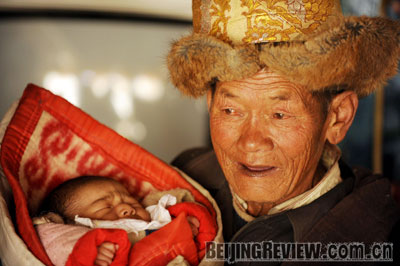|
 |
|
TWO DIFFERENT GENERATIONS: Myima Toinzhub, a former serf of Pharlha Manor, holds his newborn great-grandson (JIN LIANGKUAI) |
How much could a man's life change in 50 years? For Myima Toinzhub, it has changed a lot. Once an oppressed serf in Tibet's Gyangze County, the 75-year-old is now a well-known yak farmer earning 5,000 yuan ($220) a year selling dairy products from his 11 animals. His family also grows two hectares of highland barley, radishes and potatoes.
Today, the old man lives with his oldest son's family in a spacious two-story, 300-square-meter building. The house's most extravagantly decorated room is its prayer niche, where beautiful tangka--a kind of Tibetan scroll painting--and solemn Buddha statues are on display.
Each day he gets up when the sun rises, has a sip of buttered tea on his comfortable sofa and then takes a stroll in the fields. His children help milk cows and send the milk to the market. When he feels well, Toinzhub will hitchhike to the city and spend a whole afternoon relaxing in a teahouse with his friends.
Toinzhub's grandson, Gabu, had just returned home from college for winter vacation when a Beijing Review reporter visited. Gabu is a junior at Lhasa Teachers' College majoring in the Tibetan language. He plans to be a high-school teacher after graduation.
He is a member of the college's 12-member writing club, which publishes a literary magazine called Echo every year. "My biggest dream is to publish a book of my own essays," he said. "In Tibetan, of course. My Mandarin isn't as good as my Tibetan."
Gabu's parents always taught him to work hard to achieve his dreams.
"Gabu is much luckier," said Toinzhub, who gave a loving smile. "He doesn't do any housework. We always tell him the most important thing is to study hard and get a good job. His life is totally different from mine when I was his age."
Toinzhub sank into his sofa as a flood of 50-year-old memories flashed through his mind. Before the 1959 emancipation, serfs were considered the "speaking livestock of owners," he said, with no chance for a person born to a serf family to work for a better life. It used to be that your destiny was predetermined at birth, he said.
A serf to the Pharlha Manor
Toinzhub became a serf at Pharlha Manor when he was 13 years old. He said it hurt to recall the mistreatment suffered at the hands of the manor's owners. The manor, well-preserved to date, is the former residence of the Pharlha family, one of the most powerful nobles in Tibet.
"We would be beaten almost to death even if we made a tiny mistake," he said.
Toinzhub's wife was a servant to the daughter of the manor. Once she accidentally broke a cup and was whipped ruthlessly on the face by the housekeeper.
"She was whipped harder when she cried out loud," the old man said. Recalling the painful memory made his heart ache, he said. Her bruises did not subside for weeks.
Toinzhub's family lived for 10 years in a 6-square-meter shabby and dilapidated room. Just opposite of their sad little refuge stood the luxurious Pharlha Manor. Its three stories were filled with the finest carpets, imported gold and silver jewelry and several Rolex watches.
The serfs' spirits were continuously broken, forcing them into perpetual servitude. "We only knew the owners of the manor were always right. We were just their livestock that could talk," he said.
Yeshe, another manor serf, agreed with Toinzhub's assessment of the psychological damage. When anything bad happened, he said, they believed their fate was to be plagued by misfortune.
The dawn of freedom
Toinzhub's memory of the democratic reform is hazy now but he does recall being thrilled to receive a cow, 1.4 hectares of land, 150 kg of grain and clothes. He remembers the manor owners all running away one day, leaving behind their property and all their precious belongings. People herded the cows and sheep onto the street and distributed them to families.
"We were so happy!" Toinzhub said. After receiving his share, he and other former servants found a stash of the manor's barley wine and partied on the farmland.
"I couldn't believe it was real!" he said and laughed. Toinzhub said they initially feared for the owners' return. But as time passed, Toinzhub gradually became used to his new life, in which he could work for himself and his family alone.
The day that marked a turning point in Toinzhub's life was March 28, when the Central Government dissolved Tibet's former local government and launched the democratic reform. Since that historic moment, serfs were given the right to be masters of their own lives. | 